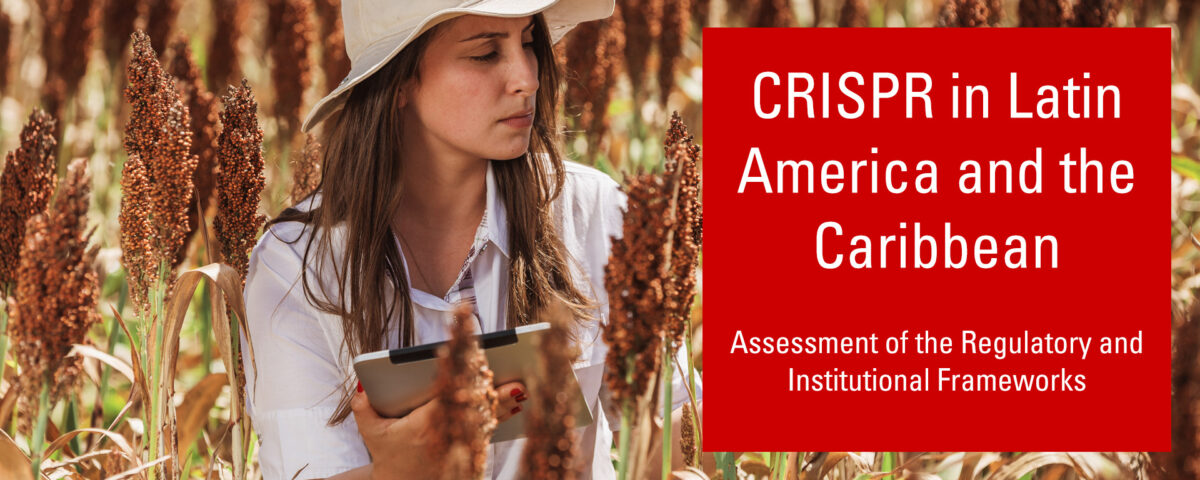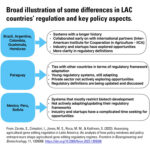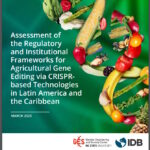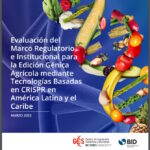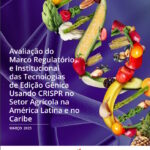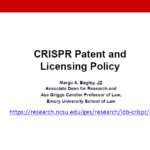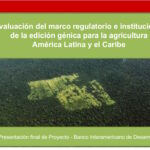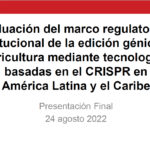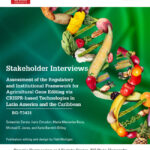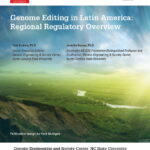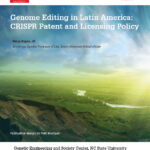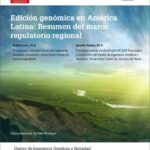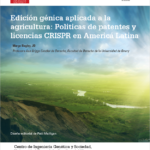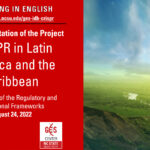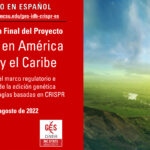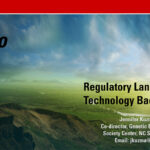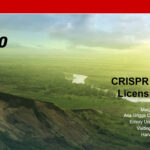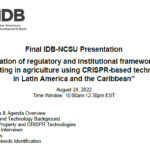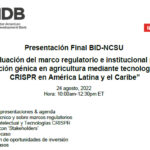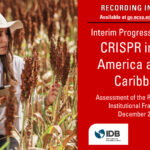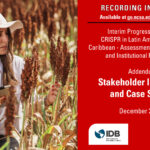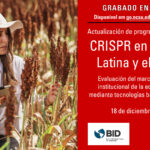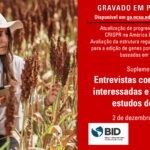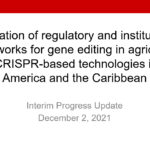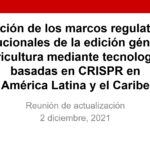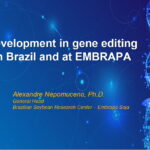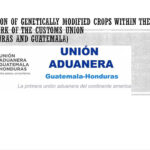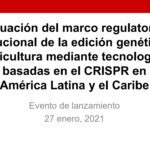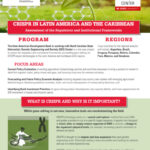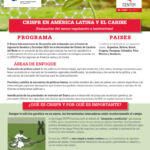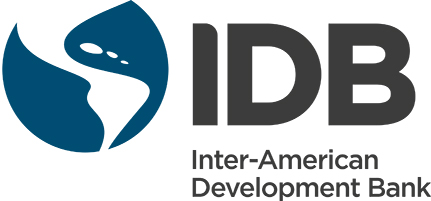CRISPR in Latin America and the Caribbean
Assessment of the Regulatory and Institutional Framework for Gene-editing via CRISPR-based Technologies
About
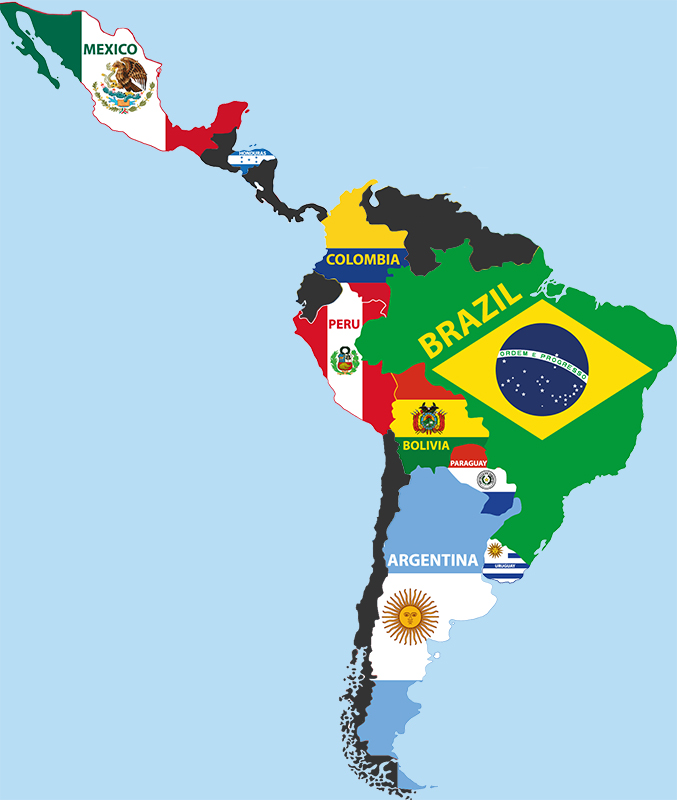
Focus countries for the regional analysis will include: Argentina, Bolivia, Brazil, Colombia, Honduras, Mexico, Paraguay, Peru, and Uruguay.
Why is it important to study the impact of gene editing in agriculture for the LAC region?
Genome editing tools have promised tremendous opportunities in agriculture for the breeding of crops and livestock across the food supply chain. Potentially addressing issues associated with a growing global population, sustainability concerns, and possibly help address the effects of climate change (Kuiken, Barrangou, and Grieger 2021). These promises come along-side environmental, cultural and socio-economic risks. Including concerns that governance systems are not keeping pace with the technological developments and are ill-equipped, or not well suited to evaluate risks new genome editing tools may introduce. Understanding these complex, dynamic interactions across the LAC region is important to inform appropriate and acceptable governance and investment strategies for the region.
Genome engineering, genome editing, and gene editing are terms that are often used interchangeably; but have distinctions. They can also be referred to as New Plant-Breeding Technologies (NPBT). According to Robb et al. genome engineering is a process, or field, where the sequence(s) of DNA are designed and modified. Genome editing and gene editing are both techniques used for genome engineering that incorporate site-specific modifications into genomic DNA using DNA repair mechanisms. Gene editing can be distinguished from genome editing in that it typically focuses only on one gene. Whereas genome editing refers to the targeted changes to non-gene regions in the hopes of inserting new genes or to modify gene-regulatory regions in order to manipulate the functions of existing genes. Genome editing has also been compared to other breeding methodologies (e.g. conventional breeding and genetic modification), where the distinctions can be important, particularly for risk assessments and regulatory decision-making.
For a comprehensive description and examples of genome editing in agriculture see Genome Editing in Agriculture: Technical and Practical Considerations (Jansing et al. 2019).
What will this project investigate?
The Inter-American Development Bank has partnered with North Carolina State University’s Genetic Engineering and Society (GES) Center to assess the regulatory and institutional frameworks surrounding gene-editing via CRISPR-based technologies in the Latin America and Caribbean (LAC) regions.
The project will study the following core components:
- Current Policy Evaluation:
Understanding what the future may hold requires a critical examination of the current status of the regulatory landscape. What are the existing regulatory systems for agricultural biotechnologies throughout Latin America? How have they included considerations for novel biotechnology strategies such as gene editing through CRISPR technologies? Further, what about the key trade partners for the region (e.g., USA, EU, China, Japan) – what reforms have been made and what is potentially on the horizon? How are discussions at the international level likely to impact the region, such as debates within the United Nations Convention on Biological Diversity? - Forecasting and Future Policy Scenario Analysis:
Potential products created through gene editing may face very different situations on the ground, depending on countries’ diverse regulations and market structures. To clarify the potential impacts of regulatory reforms, we will include concrete case studies in our analysis. The dimensions of the analysis will be holistic, to include economic, trade, and social consequences of potential policy directions. - Identifying Bank investment priorities:
The diversity of the region naturally means that countries will have unique priorities and needs with respect to investment in the agricultural biotechnology development and regulatory infrastructure. We will document the accomplishments of the region in the development of gene edited products, highlighting both private and public sector innovations. We will also evaluate the gaps in capacity for development and evaluation of CRISPR-based innovations.
Project Resources
Additional Resources on Genome Editing
- Innovative Genomics Institute
- Broad Institute
- Click here for an updated list of publications on genome editing in agriculture.
What is Gene Editing?
The power and promise of gene editing, CRISPR specifically, was first realized with the discovery of CRISPR loci in the 1980s (Anzalone, Koblan, and Liu 2020). Since that time, CRISPR-Cas systems have been further developed enabling genome editing in virtually all organisms across the tree of life (Anzalone, Koblan, and Liu 2020).
Gene editing is not a singular technology or technique; it refers most often to a set of techniques that enable the manipulation of a genome with greater precision than previous iterations of genetic engineering (Shukla-Jones, Friedrichs, and Winickoff 2018b).
They are designed to insert, delete, or alter either one or more DNA nucleotides (Shukla-Jones, Friedrichs, and Winickoff 2018a).
In the last few years, there have been rapid developments of a diverse set of genome editing tools and CRISPR-based technologies that have revolutionized genome manipulation (Kuiken, Barrangou, and Grieger 2021). These developments are democratizing access and enabling a more diverse set of actors to redefine research and development for biotechnology products encompassing food, agriculture, and medicine than has been seen with other emerging technologies (Kuiken, Barrangou, and Grieger 2021). However, these developments are also raising concerns about environmental, cultural and socio-economic risks. Including whether governance systems can keep pace with their rapid developments.
These tools can include but are not limited to:
- CRISPR/Cas9 – Clustered Regularly Interspaced Short Palindromic Repeats
- TALEN – Transcription Activator-Like Effector Nucleases
- ZNF – Zinc-Finger Nucleases
- ODM – Oligonucleotide Directed Mutagenesis
Three main types of gene editing
*SDN2 or SDN3 donor templates can come from the same or different species (cisgenic or transgenic).
Genome Editing Type | Description |
|---|---|
| SDN1 (site-directed nuclease 1) | Involves the unguided repair of a targeted double-strand break (DSB) by the mechanism called nonhomologous end joining. The spontaneous repair of this break can lead to a mutation causing gene silencing, gene knock-out or a change in the activity of a gene. |
| SDN2* (site-directed nuclease 2) | Involves a template-guided repair of a targeted DSB using a sequence donor, typically short single-stranded DNA. The donor carries one or several small mutations flanked by two sequences matching both ends of the DSB, and is thus recognized as a repair template, allowing the introduction of the mutation(s) at the target site. |
| SDN3* (site-directed nuclease 3) | Involves a template-guided repair of a targeted DSB using a sequence donor, typically double-stranded DNA containing an entire gene or an even longer genetic element(s). Both ends of the donor are homologous to the DSB ends (and the donor sequence is usually more than 800 bp each), which therefore recognize the donor as a repair template, allowing the introduction of the gene or genetic element(s)at the target site. |
Overview of genome-editing tools, the possible genetic outcomes in each case, and examples of crop traits generated using these tools
The colored arrows and boxes link published crop trait examples with the associated genome-editing tool and outcome.
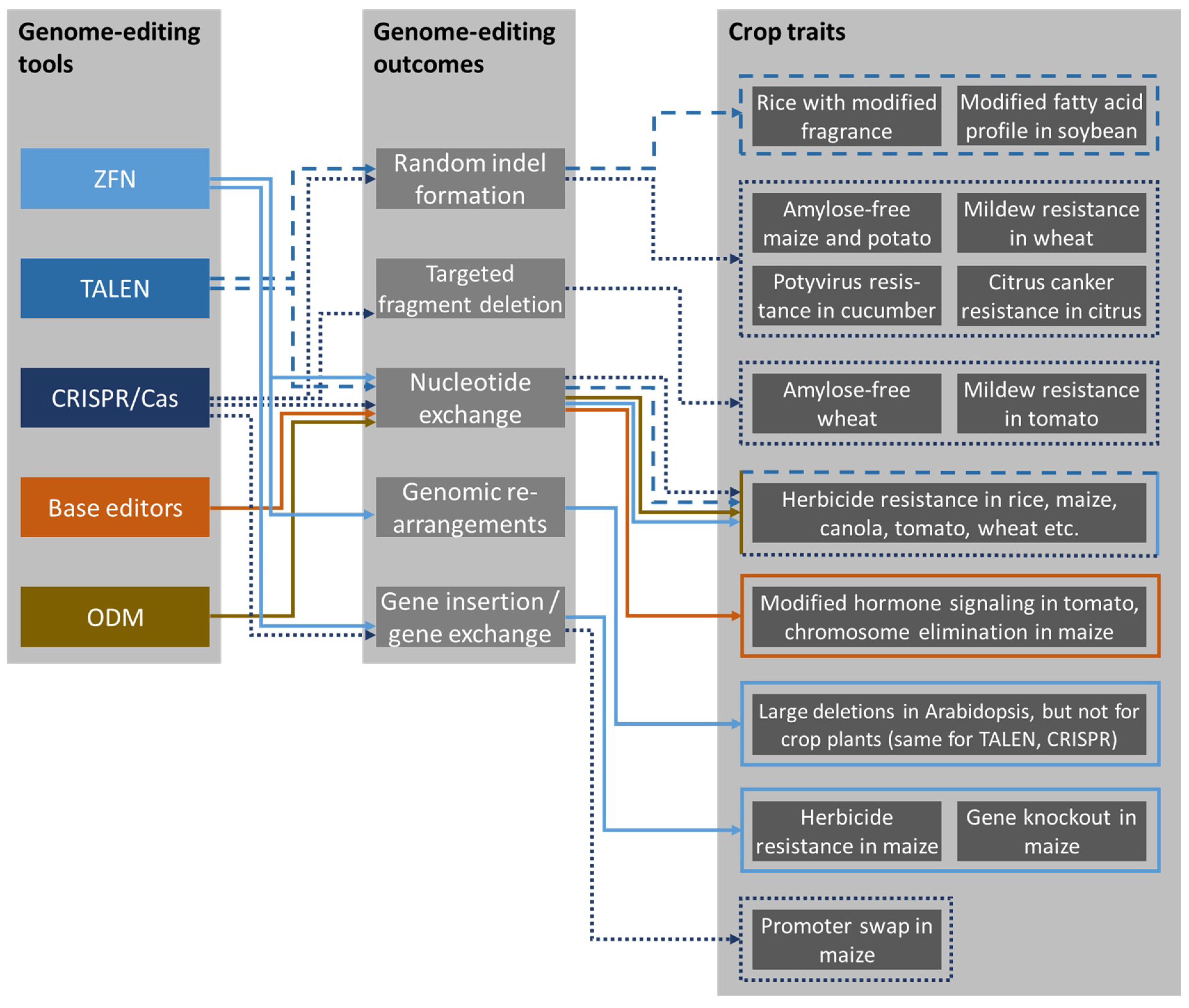
Note: Reprinted from Jansing, J. et al. Genome Editing in Agriculture: Technical and Practical Considerations. Int. J. Mol. Sci. 2019, 20, 2888. doi: 10.3390/ijms20122888
Team
Project Head

Gonzalo Muñoz, MA
Senior Rural Development Specialist, Inter-American Development Bank
Email: gonzalom@iadb.org
Principal Investigator

Katie Barnhill-Dilling, PhD
Senior Research Scholar, Genetic Engineering and Society Center, NC State University
Email: skbarnhi@ncsu.edu
Principal Investigator

Michael S. Jones, PhD
Assistant Professor of Economics, University of Alaska Anchorage
Email: msjones6@alaska.edu
Co-Principal Investigator

Jennifer Kuzma, PhD
Co-director, Genetic Engineering and Society Center, NC State University
Email: jkuzma@ncsu.edu
Co-Principal Investigator

Zachary S. Brown, PhD
Associate Professor of Agricultural and Resource Economics, NC State University
Email: zsbrown2@ncsu.edu
Co-Principal Investigator

Luciana Ambrozevicius, PhD
Independent Consultant, Brazil
Email: lupiambro@gmail.com
Co-Principal Investigator

Margo Bagley, JD
Asa Griggs Candler Professor of Law, Emory University School of Law
Email: mbagley@emory.edu
Co-Principal Investigator
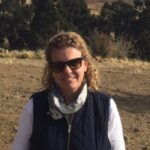
Maria Mercedes Roca, PhD
Executive Director, BioScience Think Tank
Email: prof.mariamercedesroca@gmail.com
PhD Student

Sebastian Zarate
PhD Student in Forestry and Environmental Resources and AgBioFEWS Fellow
Email: jszarate@ncsu.edu
Project Staff

Patti Mulligan
Communications Director, Genetic Engineering and Society Center, NC State University
Email: phmullig@ncsu.edu
Project Staff

Sharon Stauffer
Center Program Manager, Genetic Engineering and Society Center, NC State University
Email: sastauff@ncsu.edu
Advisor

Eirivelthon Santos Lima, PhD
Former Leading Rural Development Specialist, Inter-American Development Bank
Advisor

Todd Kuiken, PhD
Former Senior Research Scholar, Genetic Engineering and Society Center, NC State University – no longer at NC State
Grupo de Trabjo Ad Hoc (GTA)
Members
Argentina
Sra. Dalia Lewi
Director, National Bioeconomy Directorate
Ministry of Agriculture, Livestock and Fisheries
Brazil
Dr. Alexandre Nepomuceno
General Head - National Soybean Research Center - Embrapa
Colombia
Alberto Alfonso Rosero
Technical Director of Seed Programs - Instituto Colombiano Agropecuario (ICA)
Honduras
Roger Orellana
Head of Seed Certification Department, SENSA
Uruguay
Alejandra Ferenczi
Biosafety Manager, General Directorate of Biosafety and Food Safety
Ministry of Livestock, Agriculture and Fisheries
Contact Us
Sponsor
The Inter-American Development Bank works to improve lives in Latin America and the Caribbean. Through financial and technical support for countries working to reduce poverty and inequality, IDB helps improve health and education, and advance infrastructure to achieve development in a sustainable, climate-friendly way. With a history dating back to 1959, today IDB is the leading source of development financing for Latin America and the Caribbean. IDB provides loans, grants, and technical assistance; and conducts extensive research. The Bank’s current focus areas include three development challenges – social inclusion and equality, productivity and innovation, and economic integration – and three cross-cutting issues – gender equality and diversity, climate change and environmental sustainability; and institutional capacity and the rule of law.
Citations
Anzalone, Andrew V., Luke W. Koblan, and David R. Liu. 2020. “Genome Editing with CRISPR–Cas Nucleases, Base Editors, Transposases and Prime Editors.” Nature Biotechnology 38 (7): 824–44. https://doi.org/10.1038/s41587-020-0561-9
Friedrichs, Steffi, Yoko Takasu, Peter Kearns, Bertrand Dagallier, Ryudai Oshima, Janet Schofield, and Catherine Moreddu. 2019a. “An Overview of Regulatory Approaches to Genome Editing in Agriculture.” Biotechnology Research and Innovation 3 (2): 208–20. https://doi.org/10.1016/j.biori.2019.07.001
Friedrichs, Steffi, Yoko Takasu, Peter Kearns, Bertrand Dagallier, Ryudai Oshima, Janet Schofield, and Catherine Moreddu. 2019b. “Meeting Report of the OECD Conference on ‘Genome Editing: Applications in Agriculture—Implications for Health, Environment and Regulation.’” Transgenic Research 28 (3–4): 419–63. https://doi.org/10.1007/s11248-019-00154-1
Jansing, Julia, Andreas Schiermeyer, Stefan Schillberg, Rainer Fischer, and Luisa Bortesi. 2019. “Genome Editing in Agriculture: Technical and Practical Considerations.” International Journal of Molecular Sciences 20 (12): 2888. https://doi.org/10.3390/ijms20122888
Kuiken, Todd, Rodolphe Barrangou, and Khara Grieger. 2021. “(Broken) Promises of Sustainable Food and Agriculture through New Biotechnologies: The CRISPR Case.” The CRISPR Journal, February, 1–7. https://doi.org/10.1089/crispr.2020.0098
Shukla-Jones, Anu, Steffi Friedrichs, and David E. Winickoff. 2018a. “Gene Editing in an International Context” OECD Scien. https://doi.org/10.1177/0149206304273662
Shukla-Jones, Anu, Steffi Friedrichs, and David E Winickoff. 2018b. “Gene Editing in an International Context: Scientific, Economic and Social Issues across Sectors.” OECD Publishing. https://doi.org/10.1787/18151965
